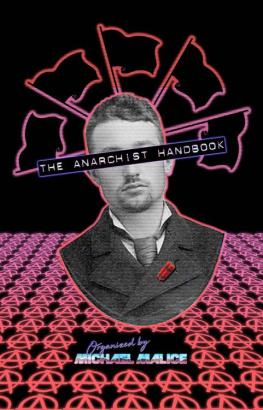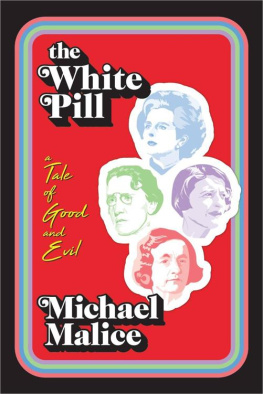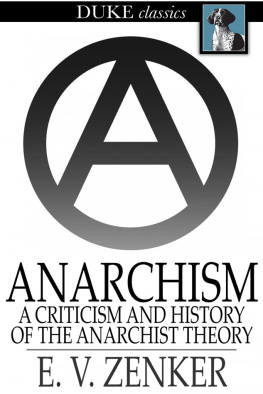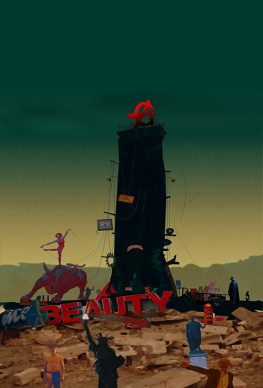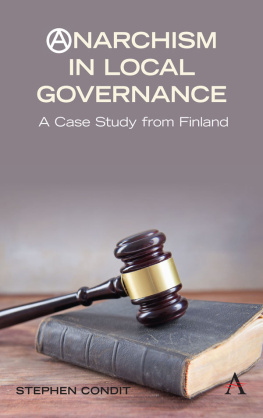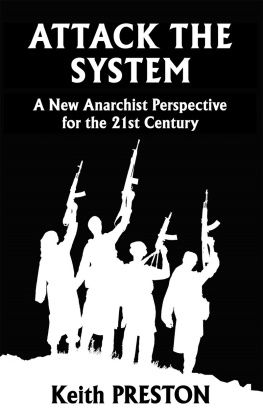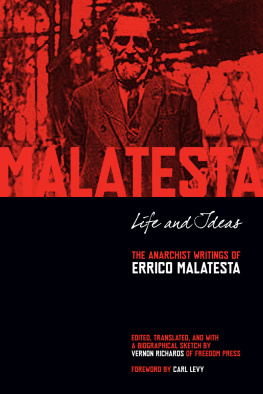
ALSO BY MICHAEL MALICE
Dear Reader: The Unauthorized Autobiography of Kim Jong Il
The New Right: A Journey to the Fringe of American Politics
The
Anarchist
Handbook
Organized by
MICHAEL MALICE
What started the craze to kill was a lecture I heard some little time ago by Emma Goldman. She was in Cleveland and I and other Anarchists went to hear her. She set me on fire.
Her doctrine that all rulers should be exterminated was what set me to thinking so that my head nearly split with the pain. Miss Goldmans words went right through me and when I left the lecture I had made up my mind that I would have to do something heroic for the cause I loved.
Leon Czolgosz
Copyright 2021 Michael Malice
All rights reserved.
Chapter 18 1970 Morris & Linda Tannehill. Reprinted by permission of Laissez-Faire Books.
Chapter 19 1973 and 2014 David Friedman. Reprinted by permission of the author. The entirety of The Machinery of Freedom is available online at http://www.daviddfriedman.com/The_Machinery_of_Freedom_.pdf
Chapter 20 1974 Murray Rothbard. Reprinted by permission of the Mises Institute.
Chapter 21 1995 John Hasmas. Reprinted by permission of the author.
ISBN: 9798748719629
CONTENTS

Chapter 1
Hoch Die Anarchie!
When I was in college I took a bioethics course. Within the first couple of pages of our textbook there was an illustration charting the spectrum of relationships between morality and the law. One end was marked as legalism, the belief that the law defined what it is moral. The other end was labeled antinomianism, which was presented as the view that ones conscience is the arbiter of morality and that laws are of no moral relevance. I cant remember if it was the textbook or the professor, but our class discussion opened with, Since no one believes in antinomianism, the answer is somewhere to the other side of the bar.
If an ideology had a name, the odds were quite high that someone did, in fact, believe in it. Antinomianism in ethics is anarchism in a sociopolitical context, the belief that the imposition of authority is illegitimate. In one sense, anarchism is nothing more than the declaration that You do not speak for me. Everything else is just implementation.
It is impossible to have a radical philosophy without at first sounding like a lunatic or a moron. One of the reasons for this is that most radical philosophies are lunacy, and the rest for the most part are moronic. To proclaim earnestly that This , the status quo, doesnt just need tweaks or massive changes but a fundamental reorganization is an enormously high task to argue for. Its akin to discussing a friend and mentioning that hes very tall. One can perhaps push the envelope with an eight-foot-tall friend. But to claim someone is, say, twenty feet tall or apple feet tall simply wouldnt make any sense. The listener would have no frame of reference to even approximate what was meant to be said. This is what a society without the state sounds like to most people, for they have taken the legitimacy of government for granted all of their lives. An alternative is incomprehensible.
There are many common visceral arguments against anarchism: Anarchism is a bad idea because it would lead to a government. Anarchism would mean authoritarian warlords being in charge of the society. Anarchism is utopian and hasnt worked anywhere on earthexcept when it has, in which case it doesnt count because a government exists somewhere and therefore made it work. Anarchism cannot work on a large scale, and anarchism cannot work on a small scale either because those areas would immediately be invaded. Inherent in this argument is that governments are, by their nature, invasive and predatorythis being the anarchist view of the nature of government.
There are already several countries on earth that dont have a military, and yes many rely on foreign governments to protect them against invasion. The argument is that these foreign governments are thereby the real government. But outsourcing the delivery of security is no different than outsourcing the delivery of food. If the security insurers were the real governments, they would be the ones giving and not taking orders. Yet all this misses the broader point: Anarchism is not a location. Anarchism is a relationship, one in which none of the parties has authority over the other.
Every nation is in an anarchist relationship with one another. If a Canadian kills an American in Mexico, there is some agreed-upon mechanism to adjudicate the situation without involving a higher authoritybecause there is no higher authority to invoke. The situation would be the same if ones citizenship were voluntary and as easy to switch as a cell-phone provider. Citizenship by geography is landline technology in a post-smartphone world.
At base level, all anarchism claims to do is to resolve one major problem in interpersonal relationships: the forceful interjection of the state. Curing cancer would make things a lot better for many people. Yes, there would be costs: oncologists would be out of work, and cancer researchers would need new subjects to explore. An anarchist world would still have murderers, and thieves, and evil men and women. It simply wouldnt put them in a position to enforce their evil on everyone else via getting elected and decreeing the law.
Curing cancer does not mean or imply curing diabetes. But neither does it mean or imply that curing cancer is utopian or a goal that should not be sought. As Randolph Bourne put it over a century ago, war is the health of the statebut plunder and societal conflict are not far behind when it comes to the government. Its quite easy to stump statists by asking if they would consider it anarchism if there was a system of taxes and state action in place without a police force. How would it work is beside the point. Whether this would be anarchism is the question.
If government was a useful mechanism for adjudicating disputes, lawsuits would be as common and as easily resolved as returning an item to the store or quitting ones job. If government was an effective mechanism at solving or preventing crime, crime would be as minor a political issue as fashion is. Everyone needs to feel safe in their person, just as everyone needs clothing. Yet only one is a political issue year in and year out.
So what is the alternative to the state? Private policeor none at all? The original version of anarchism, in the left-wing European tradition, is opposed to domination by one person over another and advocates for a society based on mutual aid and complete equality. The more recent version, the right-capitalists, define themselves by opposition to the state. The right-anarchists think the left-anarchists are nave, and lack a fundamental understanding of economics. The left-anarchists think the right-anarchists arent anarchists at all, but mere apologists for corporate control and predation. Anarchism has been both a vision of a peaceful, cooperative societyand an ideology of revolutionary terror. Since the term itself an archismis a negation, there is a great deal of disagreement on what the positive alternative would look like. The black flag comes in many colors.
Next page
